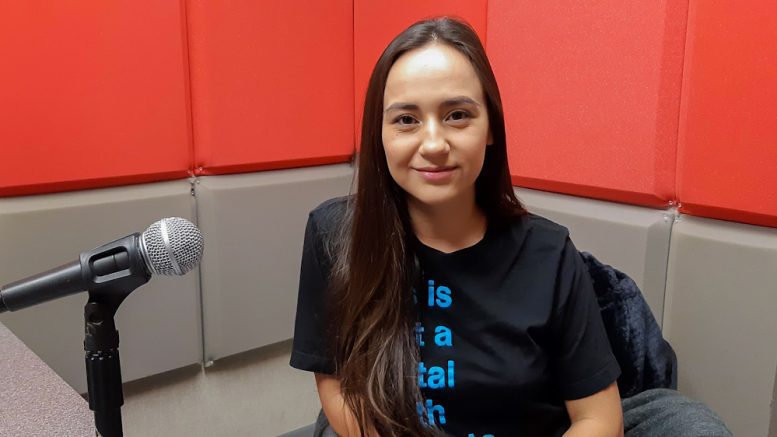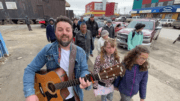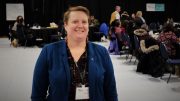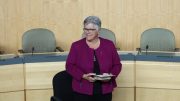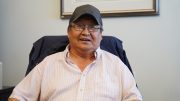A mental health advocate says access to culturally appropriate resources in the Northwest Territories is an obstacle many Indigenous people face.
Shania Young is an Indigenous woman, mental health advocate and registered nurse in Yellowknife.
On Thursday, she delivered a webinar about mental health resources available in the NWT.
Young works with Toronto-based charity Jack.org and is delivering the webinar as part of the Arctic Youth Network, a non-profit dedicated to supporting young leaders from northern regions.
CKLB spoke with Young before her webinar to discuss her personal journey with mental health, the effect COVID is having on youth, and access to resources in the NWT.
Q: How did you first start getting involved in mental health advocacy?
A: I was in my second year of university at Aurora College, and I was really struggling with my own mental health, and having a hard time coming to terms with it.
As someone who studied to be a healthcare provider, it’s difficult to admit that you can’t take care of yourself when you’re trying to take care of other people.
And at the time that I was starting to take on my own mental wellness journey, I discovered Jack.org through their summit program, and mental health advocacy.
These, alongside going through my own mental wellness journey, really encouraged me to move forward and actually really helped me in my own way, heal.
There are so many youth that struggle to understand what mental health is, and even just reaching out for mental health help or resources, is so difficult to do. If we can just bridge that gap in any way possible. I see everything as a success.
What are you planning to discuss in this upcoming webinar?
It’s a series called Wellness, Strength and Balance in a Changing North and it focuses on initiatives and best practices that youth can take to improve their mental health.
So what I’m planning on talking about is really what we see as our mental health landscape here within the Northwest Territories.
Because this webinar is a bunch of people coming together from across the circumpolar region — not just within Canada — so many of them might not understand what our landscape looks like here.
And then I’m going to dive in a little bit into some Jack.org resources. So we have our Be There program, which explains how you can learn to be there for yourself when it comes to mental health and wellness and other people.
And then, on top of that, how others can take the first steps to reach out for mental health resources so whether that be within town or online.
Q: What challenges do residents of the Northwest Territories face in terms of accessing mental health resources?
Well, when we look at the mental health resources in the North, we’re very lucky that we have the Community Counselling Program, which is available in 20 of our 33 communities.
However, when you look at the resources that are available within larger centers, the wait times in places like Yellowknife, Inuvik, Hay River are quite long. They can take five to six months, depending on where you get triage in that system.
And oftentimes, when you look at the services that are available within the North, and given our Indigenous population, and the differences between, I guess you could say western medicine versus traditional medicine, many of the services that are available are not culturally appropriate.
And given the history of residential schools, the 60’s scoop, the trauma that Indigenous people have faced. By the time that they have gotten the strength and the courage to go reach out for this mental health resource, it’s not going to meet them where they’re at and meet their needs, individually.
Q: So what is the solution to make sure there are resources that are culturally appropriate here?
A: Well, we see that the government is starting to fund on-the-land healing initiatives. And we see that a great example like an on-the-land healing mission would be the Arctic Indigenous Wellness Foundation.
That’s a great example of taking traditional practices and mixing them with some western practices as well to ensure that Indigenous people can heal their way using on-the-land, using our traditional resources.
Not just sitting in front of a person, telling them everything about yourself, only just to not see them the next week, because that’s not the counselor available within your region.
The GNWT is also offering $1.8 million GNWT funding program for on-the-land initiatives.
Q: With winter coming up and COVID here, there’s going to be limited interactions between people. Do you have any advice for people who could be struggling during that time?
A: I think it’s difficult to approach that subject because we really don’t know what it’s going to look like. We’ve seen the last six, seven months and how it’s affected everyone’s mental health and we see the increased rates of anxiety and depression, especially in our young people.
We see the statistics have gone up incredibly for that and Kids Help Phone, they’ve seen much more texters come in during this time and COVID has come up as a constant subject.
But I think we still have to take the courage and take the strength in order to reach out for mental health resources.
If you’re confused where to go, or you don’t know what to do, you can always just text one of the help lines, either the Kids Help Phone or the NWT Help Line, which are available 24/7, and they can help guide through some resources for you.
Or, there’s many online resources that are available as well. If you go through the government of Northwest Territories website, they specifically have a page based on how to reduce the stresses with COVID-19.
This interview has been edited for brevity and clarity.
Anyone in need of someone to talk with about their mental health can reach the NWT’s free 24-hour helpline at 1-800-661-0844.
Luke Carroll is a journalist originally from Brockville, Ont. He has previously worked as a reporter and editor in Ottawa, Halifax and New Brunswick. Luke is a graduate of Carleton University's bachelor of journalism program. If you have a story idea, feel free to send him an email at luke.carroll@cklbradio.com

